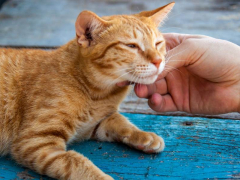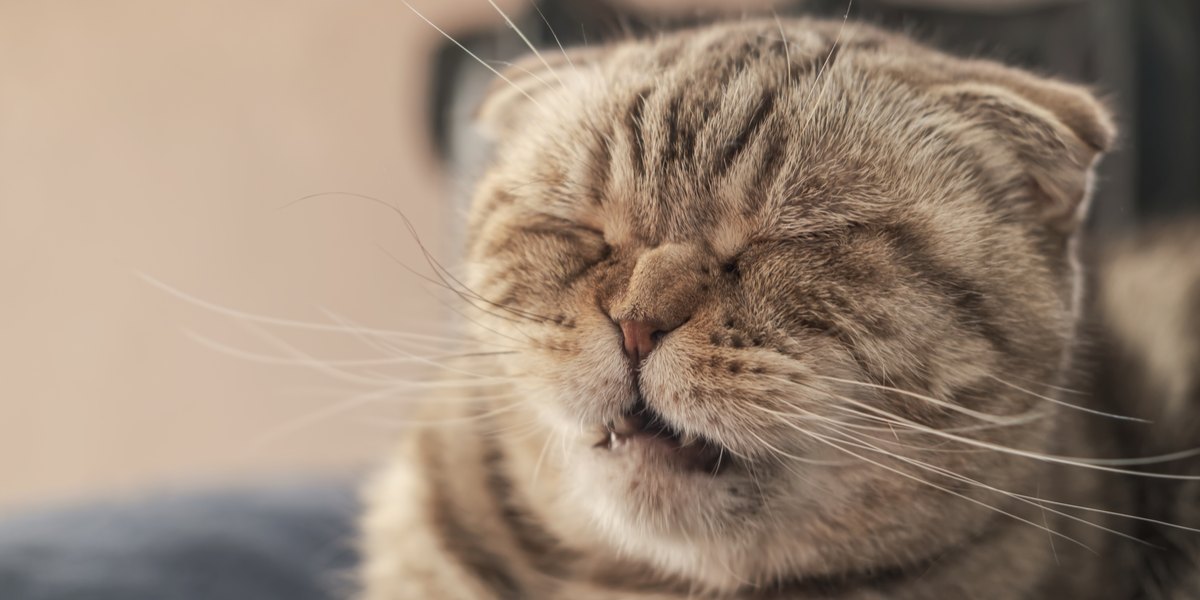
While a little blood can be harmless, seeing blood consistently or frequently when your cat sneezes can indicate a concerning issue and should be considered an emergency situation. There are many causes of sneezing blood, commonly referred to as epistaxis or a bloody nose.
A nosebleed, or epistaxis, is caused by the blood vessels in the nasal passage breaking, bleeding, and leaking out the nares, or nostrils. The bleeding itself can cause some mild irritation leading to a bout of sneezing.
If there is enough blood, it can cause a bit of a mess. There are many different diseases or disorders that can cause epistaxis leading to sneezing blood such as infections, intestinal inflammation, foreign bodies, or allergies.
It is important that, if the sneezing is persistent, if there is a large amount of blood, or if the cat is acting sick, that you bring the cat to your veterinarian for treatment right away.
Causes of a Cat Sneezing Blood
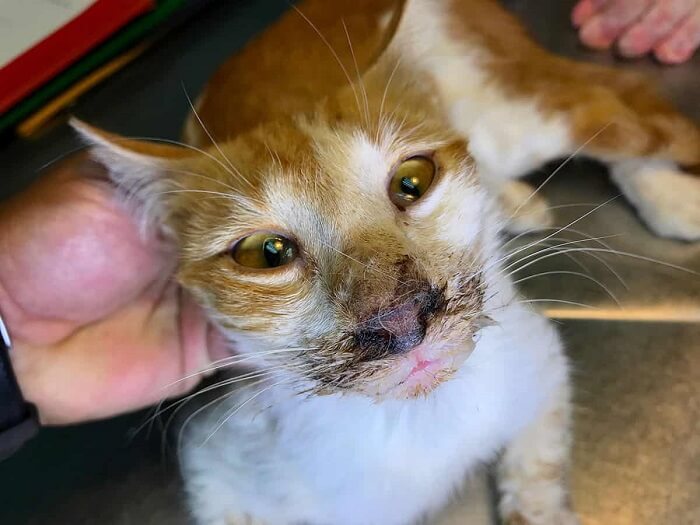
Sneezing blood can lead to a brown/red discharge around a cat’s nose.
Sneezing blood, or epistaxis, can be caused by a variety of conditions. Some are critical, while others are mild.
1. Upper Respiratory Infections
An upper respiratory infection can be caused by a variety of different bacteria or viruses and is one of the most common causes of sneezing. These are common in cats and kittens as they are very contagious between cats.
Because they are so easily transmitted between cats, they are found most commonly in places with a large number of cats such as shelters, rescues, boarding facilities, and catteries.
Most of the common bacteria and viruses that cause upper respiratory infections can be prevented with appropriate and complete vaccination, as many of the inciting viruses are included in the kitten’s vaccine series and given yearly or every few years throughout the cat’s life.
The most common viruses causing upper respiratory infections are feline herpesvirus and feline calicivirus.
Read More: Cat Cold: Causes, Symptoms, & Treatment
The Feline herpesvirus is contagious between cats but not people. Symptoms are usually brought on by stress and include sneezing, nasal discharge, runny eyes, eye infection (conjunctivitis), cough, or congestion.
Feline calicivirus has similar symptoms but also commonly causes ulcers in the mouth or nose.
Both of these viruses can range from mild symptoms which are treatable at home but can also become severe needing management in the hospital. Often, a bacterial infection can start requiring antibiotics in addition to treating the other symptoms.
If a raw nose, ulcers, or excessive sneezing occurs, blood can be seen in the nasal discharge.
The feline leukemia virus (FELV) and feline immunodeficiency virus (FIV) are other viruses that affect a cat’s immune system and can be an underlying cause to frequent upper respiratory infections.
2. Fungal infections
Cats can get fungal infections if they inhale an excessive amount of a pathogenic fungus or if they have a compromised immune system.
The most common fungus to cause a nasal infection in cats is Cryptococcus neoformans. This causes swelling of the nose, destruction of nasal tissue, nasal discharge, sneezing with or without blood, and other symptoms of upper respiratory infections.
3. Clotting Disorders
Blood contains many substances, including platelets and clotting factors that are important that help the blood clot when there has been an injury. If the process of clotting is disrupted, or if some substances in the blood are deficient, it becomes more difficult for the bleeding to stop.
Rat poison is a common cause of such clotting disorders. Toxic ingestion of rat poison or ingestion of a small animal (such as a mouse) that has eaten the rat poison, can be deadly. If a cat eats an anticoagulant rodenticide, there are antidotes if treatment is sought out immediately.
Other causes of clotting disorders and low platelets in cats include liver failure, inherited clotting diseases such as hemophilia, viruses such as feline leukemia and Feline immunodeficiency viruses, immune-mediated thrombocytopenia, cancer, bone marrow diseases, and rare drug reactions.
The quickest way to find out if there is a problem with the platelets or other clotting and blood disorders, is to perform blood work checking platelet and red blood cell counts.
4. Injuries
A cat might be sneezing blood if there has been some kind of accident or injury to the face. This might be from a fight with another animal, a car accident, or other trauma where the head or face has been injured.
5. High Blood Pressure
Cats with high blood pressure may exhibit nose bleeds and sneezing blood. High blood pressure, or hypertension, occurs when the pressure of blood flowing through a vein is simply too high for the vein to withstand, this can cause excessive bleeding or clots. This issue can become worse when a cat is stressed.
6. Cancer
There are a variety of cancers that can be found in the nasal passages, face, or sinuses in cats. These can cause swelling, destruction of the nasal tissue, bleeding, infections, sneezing, and a bloody nose.
To find out if cancer is the cause of the sneezing or mass, a sample, known as a biopsy, is taken by the veterinarian and sent to a laboratory. Once there is a diagnosis, it can be determined if the cancer is treatable.
7. Foreign Material and Inhaled Irritants
Irritants or small objects that are inhaled through the nose and enter the nasal cavity can cause sneezing and even trauma to the sensitive tissue inside. The excessive sneezing and trauma can cause bleeding.
Some common foreign material that can be inhaled include dust, pollen, small pieces of grass or other plants, bugs, or other debris. These foreign objects must be retrieved through rhinoscopy (video scoping) up the nasal cavity.
Irritants that cats can be sensitive to when inhaling them include cigarette smoke, perfumes, sprays, cleaning agents, dust, mold, scented candles, and smoke from other sources.
Be cautious when using any of these materials around your cat.
8. Polyps
Polyps are small benign masses, or growths, that can be found in the nasal passages, ears, soft palate, or throat. These can become irritated and bleed.
9. Autoimmune Disease
Cats can get diseases that affect their immune system in various ways. These can be systemic or internal disorders, diseases affecting the blood cells, or conditions affecting the skin.
10. Allergies
Common allergies such as pollens, weeds, and dust can cause nasal irritation, sneezing, and inflammation, leading to a dry or bloody nose.
When to Call the Vet
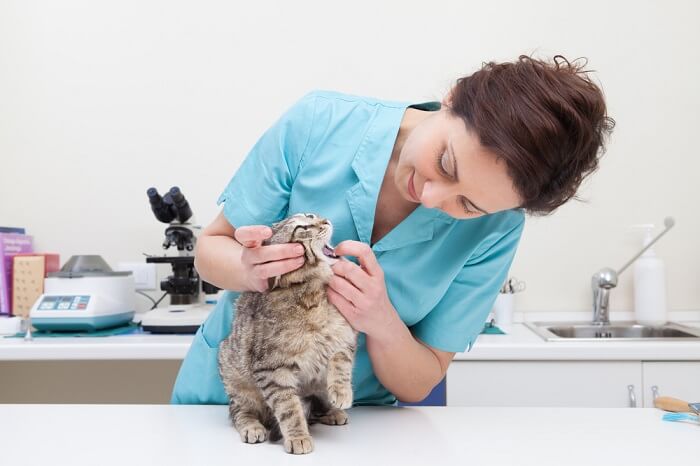
Cats with bleeding from the nose should be examined by a veterinarian.
If you notice that your cat is sneezing blood, the first and most important thing to do is to stay calm. Cats are quick to pick up on stress and are likely already anxious because of their excessive sneezing and their nose bleeding. Staying calm while still acting quickly will help keep your cat’s stress level, and blood pressure, down. Catch your cat and restrain them in a safe area.
If the bleeding doesn’t stop quickly, or there is an excessive amount of blood, the best thing to do is to quickly take your cat to see your veterinarian. Even if there is only a minor issue, it is better to address it right away before it becomes a bigger problem. If something concerning is discovered, then treating it right away is critical.
Make note of when your cat started sneezing blood, how long it lasted, if it is from one or both nostrils, any medications the cat is taking, and any accidents or injuries that occurred.
Treating a Cat Sneezing Blood
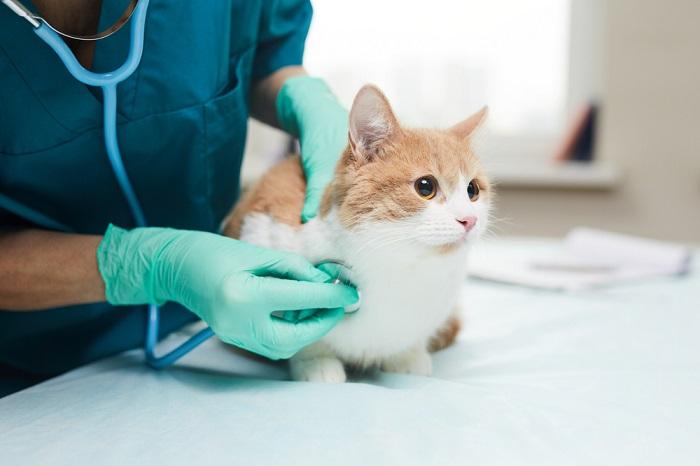
Your vet will be able to advise on treatment after a full examination of your cat.
Treatment of your cat will depend on the cause of the blood. Infections and inflammatory conditions may be treated with antimicrobials and anti-inflammatory medication. Foreign bodies, polyps, tumors and other lesions may need to be assessed and then removed where possible. Other conditions, such as high blood pressure, allergies and autoimmune conditions may require lifelong management.
Whilst waiting for the veterinarian, remain calm. If the cat allows it, applying a cold compress, such as an ice pack, to the top or sides of the cat’s nose may help slow or stop the bleeding. Cleaning the face or nose with a cool damp cloth can also be helpful. Avoid these steps if it causes more stress and always ensure that you don’t obstruct your cat’s airway and ability to breath freely.
Prevention of Cat Sneezing Blood
We can’t always prevent our cats from getting ill, but there are some actions that cat owners can take to help keep our pets in optimal health.
- Vaccination: Certain infectious diseases that can cause blood when sneezing are treated with vaccinations.
- Regular check ups: Routine wellness exams may include testing for blood pressure and other important health factors.
- Seasonal caution: Foreign bodies, such as grasses, and allergies may be more common at certain times of year, so extra care may be warranted at these times.
Conclusion
While there are many reasons a cat might sneeze blood, the important things to remember are to stay calm and seek veterinary care to get to the bottom of the problem.
